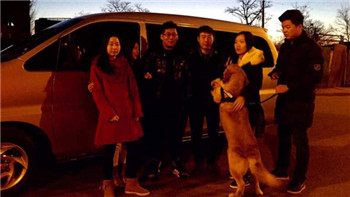(单词翻译:单击)

The world’s biggest mass migration has hitched a ride on the sharing economy, with hundreds of thousands of Chinese turning to carpooling for their annual pilgrimage home for the lunar new year.
全球规模最大的人口大迁徙搭上了共享经济的便车,数十万中国人在一年一度的春节回家过年的旅途中转向拼车服务。
The holiday season, which kicks off on Monday, will see mass criss-crossing across the country and bottlenecks at stations and on the roads, as tens of millions of migrants return back home from the cities for a fortnight of family.
在本周日开始的春节假期期间,全国各地将出现大规模人口迁移,车站和道路将人满为患,数千万务工人员将从城市回到家乡与家人共度春节。
Yan Chao, a 25-year-old mobile app developer, is one of the 300,000 travellers in the last week of January who opted to forgo these hardships and instead hitch a lift using one of the new and increasingly popular on-demand carpooling services.
25岁的移动软件开发员严超(音译)是1月最后一周30万拼车大军中的一员,他们选择放弃旅途辛苦,利用日趋流行的新的汽车拼车服务搭便车。
As growth slows, state initiatives such as Premier Li Keqiang’s “Internet Plus” strategy are making an accelerated push to fill the cracks in China’s creaking old economy using big data and mobile internet to tackle longstanding problems such as traffic congestion.
随着经济增速放缓,中国总理李克强提出的“互联网+”战略等政府举措正加紧努力,利用大数据和移动互联网填补中国岌岌可危的老经济的裂缝,解决交通拥堵等长期问题。
But progress is slowed by an inherent fear of new technologies being too disruptive and, as local governments and their taxi fleets are fighting hard for the status quo, many new initiatives stay semi-illegal until they prove sufficiently useful.
但出于对新技术破坏性太强的固有担心,这方面进展缓慢,地方政府及其出租车公司正奋力维持现状,很多新的举措处于半非法状态——直到它们被证明足够有用。
Chinese new year lift-sharing was given the green light by the authorities two weeks ago when deputy minister Wang Shuiping said the transport ministry “encouraged” carpooling services so long as they were free.
两周前,中国政府批准了春节拼车服务,当时交通部运输服务司副司长王水平表示,只要不以盈利为目的,交通部“鼓励”拼车服务。
“Obviously public transport is falling short,” said Sun Liang, a spokesperson for Didi Kuaidi, China’s homegrown Uber equivalent, which operates the carpooling platform Didi Hitch and calculated the number. It predicts 1m journeys by the end of the holiday.
中国版“优步”(Uber)、打车应用滴滴快的(Didi Kuaidi)发言人孙亮(音译)表示:“公共交通显然运力不够。”该公司经营拼车平台滴滴顺风车(Didi Hitch),并对拼车数据进行了计算。该公司预测,到春节假期结束,将有100万单拼车行程。
“Six million people standing for sometimes 40-hour train rides... our dense driver network, we thought we could help people share their resources.”
“600万人有时要站着搭乘40个小时的火车……凭借我们密集的私家车主网络,我们认为,我们能够帮助人们共享资源。”
That chimed with Yan Chao. “Using Didi Hitch was about the same price, and it is much more convenient and comfortable,” he said.
这与严超产生了共鸣。他表示:“利用滴滴顺风车价格与公共交通一样,但方便得多,也舒适得多。”
Because of its established driver network, Didi Kuaidi’s service, which is currently free of charge, is among the most trusted options, as it comes with insurance and a code of conduct for drivers.
借助现有的车主网络,滴滴快的顺风车服务(目前不收取任何费用)是最受信赖的出行选择之一,公司还为车主和乘客提供了保险,并对车主实行行为准则。
The platform was launched last June as a short-range commuter sharing service that Didi hoped would relieve the “pain point” of China’s nightmare rush hours and help the environment.
滴滴顺风车于去年6月推出,滴滴希望这种短程通勤拼车服务将缓解中国交通高峰的“痛点”并有利于环境。
But it is not all altruistic: non-profit services such as these help Didi Kuaidi keep customers and the authorities onside — something Uber’s various travails around the world have shown to be a valuable commodity.
但这并非完全无私:这类非盈利服务帮助滴滴快的争取到客户和政府的支持,优步在全球的各种遭遇表明这种支持非常宝贵。
The transport ministry’s Mr Wang injected a note of caution, saying he “hopes both sides clarify their interests [before setting off] to avoid unnecessary conflict”.
中国交通部的王水平提出了告诫,他表示他“希望双方(在出行前)明晰权益,以避免不必要的纠纷”。
Yan Chao, meanwhile, laughs off worries of being cheated on the road. “I spoke with [the driver] many times, and confirmed details — including that he would be bringing his dog in the car,” he said. “It’s not a big issue.”
与此同时,严超对于在路上被骗的担忧一笑置之。“我与(车主)交谈过很多次,证实了一些细节,包括他会把他的狗带上车,”他说道,“这不是个大问题。”


